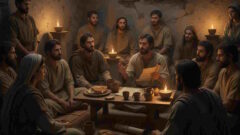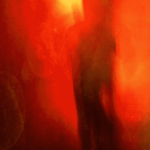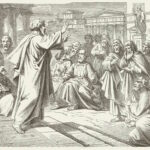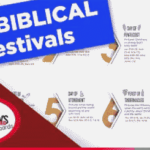The Sabbath Beyond the Shadows: Fulfilled or Forgotten? truthsum.org
Is the Sabbath just an Old Testament shadow – something Christ fulfilled and left behind? Many Christians believe so, often pointing to Colossians 2:17 or Hebrews 4 to argue that Jesus replaced the weekly Sabbath with a spiritual kind of rest. But Scripture tells a fuller story. The Sabbath wasn’t first given at Sinai – it was blessed and sanctified at creation (Genesis 2:2–3). Long…
What Are You Practicing? truthsum.org
In Matthew 7:23, Jesus warns, “Depart from Me, you who practice lawlessness.” He doesn’t rebuke them for sinning once – but for making sin a lifestyle. These individuals called Him “Lord,” performed miracles, and looked religious—but their actions denied God’s law. Lawlessness isn’t just breaking rules; it’s rejecting God’s authority. It can include sincere people who’ve been taught that God’s commands—like the Sabbath or His…
A Tale of Two Plans: What Most Christians Miss About God’s Ultimate Purpose truthsum.org
Walk into most churches today and you’ll hear a familiar message: accept Jesus now or face eternal torment in hell. It’s a message meant to inspire urgency – but it also leaves many wondering about the billions who never had a chance to hear the gospel. Is this really God’s plan? Scripture tells a bigger story. From Genesis to Revelation, the Bible reveals a plan…
Living the Convincing Life: The Biblical Power of Example Over Argument truthsum.org
In a world overflowing with noise and opinions, the Bible points us to a quieter—but far more powerful – way of influence: a life well-lived. From beginning to end, Scripture emphasizes how God’s people live, not how loudly they speak. The greatest testimony is not clever words or forceful debates, but integrity, humility, and obedience to God’s ways. Israel was never sent to convert the…
Modern Israel: A Forgotten Promise Remembered truthsum.org
When people hear “Israel” today, they often think only of the Jewish people. But biblically, Israel originally referred to all twelve tribes – descendants of Jacob’s sons – not just Judah. After the kingdom divided, the ten northern tribes retained the name Israel and were later exiled by Assyria around 721 BC, becoming the “lost tribes.” Yet God made enduring promises to these tribes, including…
Reasoning with God: The Forgotten Discipline in Theology truthsum.org
In an age where we’re told to “trust the experts,” many forget that reasoning isn’t just a philosophical tool – it’s a biblical command. From theology to politics, society is increasingly split between blind trust in authority and the bold question: Does this actually make sense? The Bible not only allows that question – it encourages it. Isaiah 1:18 says, “Come now, and let us…
Will the Dead Live Again? – Richard F. Ames thebiblesaysthat.com
Are you worried about loved ones who died without knowing Christ? Are they lost forever in torment? The truth is far more hopeful—and far less understood – than most imagine. Many believe in an ever-burning hell because of tradition, not Scripture. Dante’s Inferno, not the Bible, shaped much of today’s imagery of hell. But your Bible says, “The wages of sin is death” (Romans 6:23)…
Pentecost and the Promise of the Father – John LaBissoniere ucg.org
Imagine if Jesus lived next door – healing, comforting, and guiding us instantly. Though He ascended to the Father long ago (John 16:28), He promised something even greater: the arrival of the Holy Spirit. At first, this seemed sorrowful to the disciples (John 16:6), but Jesus assured them it was for their benefit: “If I do not go away, the Helper will not come” (John…
Did Jesus Abolish the Seventh-day Sabbath? cbcg.org
In the Sermon on the Mount, Jesus affirmed that God’s commandments remain in force under the New Covenant “Therefore, whoever shall break one of these least commandments, and shall teach men so, shall be called least in the kingdom of [from] heaven; but whoever shall practice and teach them, this one shall be called great in the kingdom of heaven”(Matt. 5:19). Yet today, the Fourth…
Will Deceive Many (Part One) – Pat Higgins cgg.org
In Matthew 16:3, Jesus rebukes the Pharisees for recognizing weather signs but ignoring the “signs of the times.” Could we be making the same mistake? Our world is in rapid moral decline – corruption touches every institution. Jesus warned of days like these, comparing them to Noah’s time, when “all flesh had corrupted their way” (Genesis 6:12). As in Noah’s day, deception now defines our…
The Apostle Paul’s Teaching on Justification in the Book of Galatians cbcg.org
Many use Galatians 5:18 – “But if ye be led of the Spirit, ye are not under the law” – to argue that Christians are no longer required to keep God’s commandments. But this interpretation is based on poor translation and misunderstanding. The original Greek lacks the definite article “the,” meaning it should read, “not under law.” But what kind of law is Paul referring…
Were Holy Days the Heresy at Colosse? – Eddie Johnson lifehopeandtruth.com
Colossians 2:16-17 is often misunderstood as proof that Paul rejected biblical holy days and food laws. But a closer look reveals something different. Paul wrote to counter false teachings – especially early forms of gnosticism – that had infiltrated the Colossian church. Some gnostics, particularly the ascetic kind, weren’t rejecting holy days altogether. Instead, they were keeping them in harsh, self-denying ways and judging others…
God’s Seven Biblical Holy Days and Festivals youtu.be
God’s Plan in the Festivals: A Story of Family, Redemption, and Glory God has had a plan from the beginning. He created humanity with a purpose – not just to live and die, but to become part of His eternal family. This incredible truth is revealed in the life and teachings of Jesus Christ and pictured clearly through the seven annual festivals God established. These…
Resisting to Bloodshed – Jeremy Lallier sabbaththoughts.com
Resist the Shattering Here’s the bad news: Satan is out to get you. He wants to ruin your salvation, crush your spiritual potential, and leave you broken. But here’s the good news: He can’t – unless we let him. Jesus promises, “No one is able to snatch them out of My Father’s hand” (John 10:29). Our salvation is secure, but that doesn’t mean Satan stops…
“But Let a Man Examine Himself”: 10 Questions to Ask Before Passover – Jeremy Lallier sabbaththoughts.com
As Passover approaches, self-examination is vital—but if we’re not careful, it can quickly slide into self-condemnation. It’s easy to focus on how far we still have to go: the struggles, the shortcomings, the sense that we haven’t done enough. Growth matters. But when our eyes are fixed only on our flaws, we risk missing the very purpose of the season. Paul wrote that in taking…
Are Christians Once Saved, Always Saved? ucg.org
Some believe that once a person accepts Jesus Christ as Savior, their salvation is forever assured—often called “eternal security” or “once saved, always saved.” But does the Bible actually teach this? A common proof text is John 10:27-29, where Jesus says His sheep hear His voice and no one can snatch them from His or the Father’s hand. However, this speaks of external threats, not…
The Son Makes Us Free – Brian Orchard leadingtolife.org
The Hedgehog Review, an intellectual publication, explores deep philosophical and ethical questions. One article begins with the question: “How do we foster the conditions conducive to a truly enduring moral and ethical order?” Intellectuals seek this order, often examining Critical Theory from the Frankfurt School, including Theodore Adorno’s work. One study titled “Glimpses of Light from Enlightenment’s Prison” critiques the Enlightenment as a restrictive framework….
What Is Hell? – Steve Myers, Tom Robinson ucg.org
What happens to bad people when they die? Or to those who aren’t Christians? Do they suffer forever in a fiery hell? Many assume so, but does eternal torment fit a loving God? Would He punish someone forever for a brief lifetime of mistakes? That concept portrays God as cruel, contradicting His nature of love (1 John 4:8). Surprisingly, the Bible doesn’t teach an ever-burning…























